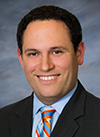I never anticipated liking law school. I took a break from legislative work to study constitutional and administrative law. Civil procedure, contracts, and property held no apparent interest. But a few days into my 1L year, I was captivated by the law’s constant process of revision as existing rules are applied to new facts and novel ideas. I ultimately found the daily tasks of lawyering preferable to those of advocating policy. Now a litigator, I still relish new ideas. Here are three legal ideas I’ve recently found engaging.
 Jeffrey A. Mandell, Chicago 2006, is a senior associate at Stafford Rosenbaum LLP, Madison, and associate chair of the firm’s appellate practice group. He also is chair of the Madison Lawyer Chapter of the American Constitution Society.
Jeffrey A. Mandell, Chicago 2006, is a senior associate at Stafford Rosenbaum LLP, Madison, and associate chair of the firm’s appellate practice group. He also is chair of the Madison Lawyer Chapter of the American Constitution Society.
Is the United States facing inexorable constitutional collapse? Vox.com’s Matt Yglesias believes it is. He reasons that our governing institutions aren’t built to withstand extended gridlock. Yet gridlock is increasingly entrenched. Our leaders respond with unprecedented actions – for example, sweeping assertions of executive authority and U.S. Senate obstruction of presidential nominees. Notwithstanding the novel nature of these actions, they are largely motivated by good-faith beliefs that the ends are in the public interest. As I explained in a blog post, I agree with each of these premises but find Yglesias’s prediction of systemic failure less convincing.
What rights does the Second Amendment afford to those who choose not to carry a gun? The First Amendment’s guarantee of free speech protects the right to stay silent; its protection for free religious exercise safeguards the right not to practice any faith. What implied negative rights does the Second Amendment protect? And how do other civil liberties enshrined in the Bill of Rights help define the contours of the rights – positive and negative – protected by the Second Amendment? I have often returned to these questions in recent years.
What consequences might follow from the Wisconsin Supreme Court’s rejection of “minority vote pooling”? Three decades ago, in State v. Gustafson, the court held that to avoid “arbitrary and illogical results” it would not allow minority views to “unite and constitute a majority of the court.” Gustafson’s approach differs from U.S. Supreme Court practice, which aggregates minority rationales that support a common result. Twice in the past three years, citing Gustafson, the Wisconsin Supreme Court has deadlocked on the same criminal-procedure question. What, if anything, do these cases portend with respect to Wisconsin Supreme Court procedure?
I enjoy litigating because
it constantly exposes
me to new ideas. But the
cases on my docket raise
only a fraction of the legal
questions that fascinate
me.
These ideas are less abstract than they might seem on their surface. The constitutional collapse theory, even if flawed, suggests that actions outside of constitutional norms carry consequences beyond short-term political gain or loss. The Second Amendment questions have practical relevance as states and localities seek to define the reasonable restrictions authorized in Justice Scalia’s landmark District of Columbia v. Heller opinion. And the number of areas of the law that will be affected by the Wisconsin Supreme Court’s approach to counting votes remains to be seen.
I enjoy litigating because it constantly exposes me to new ideas. But the cases on my docket raise only a fraction of the legal questions that fascinate me. I keep engaged in a broad range of ideas through constant reading and active participation in the American Constitution Society, which provides a forum for sharing and refining ideas across the spectrum of legal thought.
Meet Our Contributors
What’s your favorite part of being a lawyer?
 I’ve always enjoyed writing and teaching. Compelling legal advocacy marries the two. It requires thorough research to collect the relevant facts and authorities, careful analysis to break those raw materials down into useful parts, and clear thinking to produce powerful, easy-to-follow arguments. Whether the task is unraveling the consequences when newfangled securitized derivatives fail, delving into a jurisdictional wrinkle that has never been litigated before, or figuring out how to apply 19th-century law to a 21st-century situation, success depends on concise, cogent explanations – in writing and in colloquy with the court. I enjoy starting with a client’s tangible problem, looking for analogous precedents, and explaining why the outcome should be as I propose.
I’ve always enjoyed writing and teaching. Compelling legal advocacy marries the two. It requires thorough research to collect the relevant facts and authorities, careful analysis to break those raw materials down into useful parts, and clear thinking to produce powerful, easy-to-follow arguments. Whether the task is unraveling the consequences when newfangled securitized derivatives fail, delving into a jurisdictional wrinkle that has never been litigated before, or figuring out how to apply 19th-century law to a 21st-century situation, success depends on concise, cogent explanations – in writing and in colloquy with the court. I enjoy starting with a client’s tangible problem, looking for analogous precedents, and explaining why the outcome should be as I propose.
In the past year, I’ve also turned to blogging (primarily at Stafford Rosenbaum’s Appellate Practice Blog) as another outlet for my interest in unpuzzling certain legal issues and raising additional questions.
Jeffrey A. Mandell, Stafford Rosenbaum LLP, Madison.
